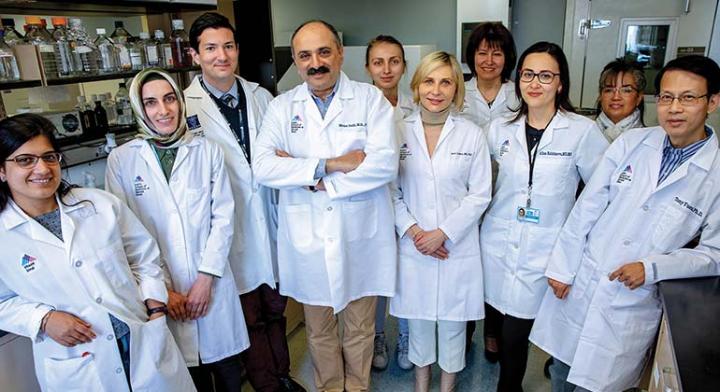
Credit: Mount Sinai Health System
A team of researchers at the Icahn School of Medicine at Mount Sinai, in collaboration with GenScript, is developing a synthetic antibody to SARS-CoV-2, the virus that causes coronavirus disease (COVID-19). This antibody is intended to block the virus from entering human lung cells, and would be another potential treatment option for COVID-19.
The efforts are being led by Mone Zaidi, MD, PhD, MACP, Director of the Mount Sinai Bone Program and Professor of Medicine (Endocrinology, Diabetes and Bone Disease) at the Icahn School of Medicine at Mount Sinai, and Tony Yuen, PhD, Associate Director for Research for the Mount Sinai Bone Program and Assistant Professor of Medicine at the Icahn School of Medicine at Mount Sinai.
Coronaviruses, including SARS-CoV-2, have many protein “spikes” protruding from their outer surface. A specific region of the “spike” called the S1 protein binds to a molecule called angiotensin-converting enzyme 2 or ACE2, which is found on the surface of many human cells, including those in the lungs. This is the entry point by which the virus infects a person.
In hopes of developing a treatment that could block the viral entry into cells, Dr. Zaidi and his team, including Sakshi Gera, PhD, a postdoctoral fellow at the Icahn School of Medicine at Mount Sinai, are creating an antibody targeted to a peptide sequence of the S1 spike protein that should interfere with, and thereby block, the virus and prevent its initial attachment and entry into human cells.
The artificial blocking antibody then could be given to people with COVID-19 to stop the virus from infecting additional cells, much as doctors are already doing with natural antibodies harvested from people who have survived COVID-19, in what is known as convalescent plasma therapy.
“Given that convalescent plasma is showing promise and potential in treating this novel virus, the same strategy should be adopted for treatment in sick patients by creating a targeted antibody, which we hope will have the ability to disengage and block COVID-19 from entering our cells. Having experience with antibody development, my lab has embarked on this task together with the generous support of GenScript,” said Dr. Zaidi.
The first step, now underway, is to create a custom version of the S1 spike’s peptide sequence, which will be used to generate the antibody. Once the peptide sequence is available, Dr. Zaidi’s team will collaborate with GenScript to generate a human antibody which will be tested for efficacy in human cells in culture and animal models. Dr. Zaidi and his team hope to then collaborate with Mount Sinai’s Department of Microbiology for further antibody testing. “It’s hard to project how long it will take to have something we can test in patients, but my aim is to have a targeted antibody for first human trials within the next 12 months if all goes as planned, but it could be earlier,” said Dr. Zaidi.
“GenScript’s collaboration with Dr. Zaidi’s lab to co-develop a COVID-19 antibody program signifies GenScript’s ongoing commitment to work with scientific communities to annihilate and prevent COVID-19 beyond its business model. We expect that GenScript’s antibody discovery and development expertise, especially in the field of COVID-19, will fuel Mount Sinai’s first-rate research and development capabilities to bring this important medication to patients,” said Kenneth Lee, Head of US Commercial Division at GenScript ProBio.
###
For more information about Mount Sinai’s COVID-19 research and response effort, visit https:/
About GenScript
GenScript is the world leader in biotechnology reagent services and biologics. Established in 2002 in New Jersey, United States, the company was the first to commercialize gene synthesis and successfully establish fully integrated capabilities for custom peptide synthesis, protein expression and engineering, custom antibody development and engineering, in vitro/in vivo pharmacology as well as a variety of catalogue products. GenScript has now expanded its business into immunotherapy, CDMO, laboratory equipment, and microbial industry to further fulfill its mission in making people and nature healthier through biotechnology. GenScript has also established open and innovative technology-driven platforms and GMP facilities for pre-clinical drug discovery and pharmaceutical products development.
About the Mount Sinai Health System
The Mount Sinai Health System is New York City’s largest academic medical system, encompassing eight hospitals, a leading medical school, and a vast network of ambulatory practices throughout the greater New York region. Mount Sinai is a national and international source of unrivaled education, translational research and discovery, and collaborative clinical leadership ensuring that we deliver the highest quality care–from prevention to treatment of the most serious and complex human diseases. The Health System includes more than 7,200 physicians and features a robust and continually expanding network of multispecialty services, including more than 400 ambulatory practice locations throughout the five boroughs of New York City, Westchester, and Long Island. The Mount Sinai Hospital is ranked No. 14 on U.S. News & World Report’s “Honor Roll” of the Top 20 Best Hospitals in the country and the Icahn School of Medicine as one of the Top 20 Best Medical Schools in the country. Mount Sinai Health System hospitals are consistently ranked regionally by specialty by U.S. News & World Report.
For more information, visit https:/
Media Contact
Kathryn Ullman
[email protected]




